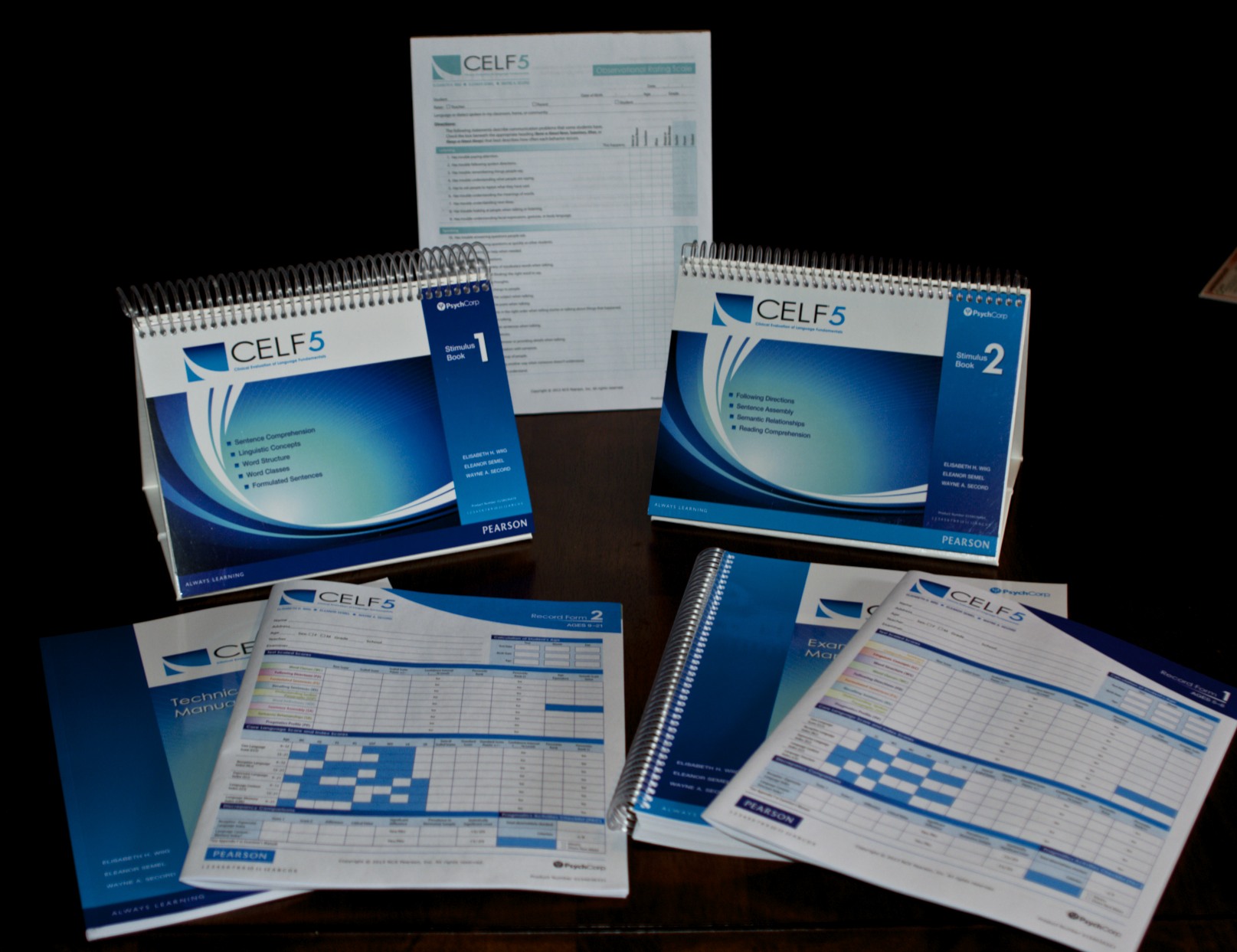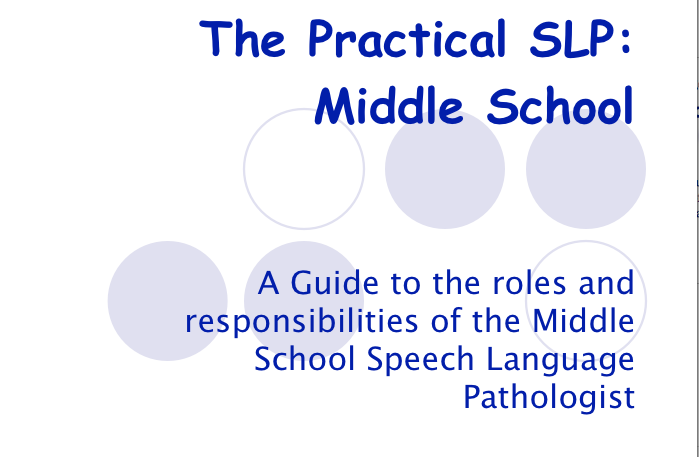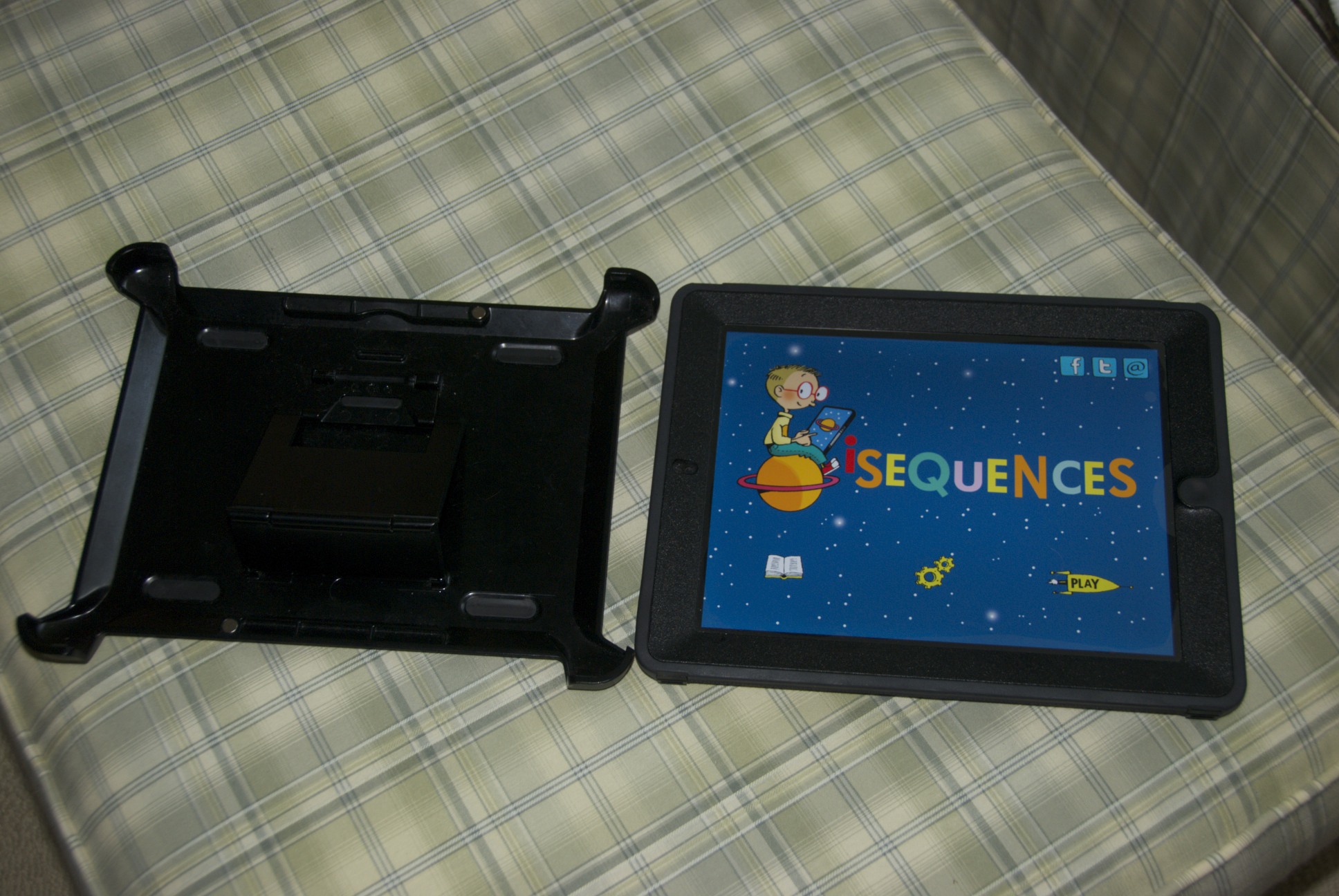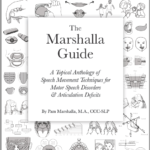Administrators: Know Your SLP’s

The biggest mistake administrators make is not getting to know their professionals. Often based on the decisions you make, things you say in meetings or even off handed comments you make it is clear to Speech Language Pathologists that you have no idea what we do, how knowledgeable we are, the resources we need to do their job better or even areas we address. When making big decisions especially those that involve procedure get your staff involved. You might be surprised at what your staff can offer. Teachers and other professional staff such as SLP’s can often be a feather in your cap if you listen to them rather than immediately disagree with them.
Learn the roll of every staff member and professional in your building or school. You never know when someone might have special training or experience to get you through a rough situation. Listen to what your staff has to say even if it’s an opinion. Successful administrators and school boards cannot have a myopic point of view. I’ve seen this happen and it does not create a strong, successful school system.
SLP’s are extremely knowledgeable. Our expertise goes beyond articulation therapy. We have training that goes way beyond academics. We know how the brain and body function together. We can pick out specific difficulties in children that can make life long differences if not remediated. We know about auditory development (not just hearing) and what happens to students who have difficulty with auditory processing, discrimination etc. We know immediately when your school system has a poor phonics program. We work on language development with severely autistic children, children with non-verbal learning disabilities and everything in-between. We work with children who have specific learning disabilities with average cognitive skills and those children who are severely learning impaired with low cognitive skills. Unless you’ve studied higher level language development you don’t have a clue it’s missing until it is almost too late. This list only hits the tip of the iceberg. I could go one and on ….. but I think you get the point.
Get to know you SLP’s and other professionals. Ask the questions and listen to them. It will only make you a better administrator.
Teresa
Q Global follow up
Last week I spoke with one of the tech people from Pearson involved with designing the Q Global scoring system. She contacted me in response to the letter I sent a few weeks back. I got the impression that her team is dedicated in making Q Global work for Speech Language Pathologists. We had a nice long chat and went over all of my concerns plus a few other concerns that other SLPs mentioned to me as a result of my initial post.
The biggest points I mentioned were that we really just want scores not necessarily a whole report and the fact that we word very piecemeal and might need some scores before we finish testing. We might not want to give the whole CELF or we often use other tests in combination with the CELF. Pearson understands that we often see children over several sessions and may need to go in and change scores/update scores/add the pragmatic information or want item analysis after our initial scoring.
Changes are in the works but because it is an online program updates take time. Pearson wants to make sure the changes are correct and they understand our needs before the update actually takes place. I believe she mentioned early February for the next update.
For now I am please with the response I received from Pearson. They have their concerns also. The biggest is, if changes are allowed will people go in and score other children to avoid paying the fee. Sure that probably will happen. However, in my opinion that’s the main reason why personal software is a better option.
I’m still not happy with the change to Q Global. Changes are hard but I did my own little study this week. I gave the CELF 5 to a student and it took me 13.5 minutes to score using Q Global. I also gave the CELF 4 and using my software at home it took me less than 3 minutes to score and generate a report. I needed to change something with the 5 and I couldn’t, I needed to add something to the 4 and it took only a few minutes. Right now I am seeing the Q Global as a step backwards. I’ve used the Q Global several times now, I am familiar with how it works so newness wouldn’t be the reason for my increased time. I did send an email to my contact at Pearson pointing out the time difference. With kids back to back we rarely have time to waste almost 15 minutes scoring, so we’re going to see this as one more thing we have to do at home.
With all that said, my contact at Pearson mentioned that there is a feedback button at the top of the Q Global home page. She encouraged me to use it. My guess is unless they hear from the masses, it will be difficult to justify the changes. So I encourage everyone to use that feedback button and let Pearson know the difficulty you have with Q Global.
My other new question to them was, is customer support available 24/7. If we can’t complete scoring tasks during the school day we might need extra support after hours. In my younger days I would be up extremely late working on reports.
Feel free to email me with any of your concerns (or use the feedback button). I will pass them along.
Q-global scoring and the CELF-5
While I am fairly pleased with the changes to the CELF 5, I’ve found the Q-global scoring system to be very inflexible around the way Speech Language Pathologists work. I expressed my concerns to Pearson a few weeks ago and they suggested I follow up with a letter. Below is a copy of the letter I sent to ClinicalCustomerSupport@Pearson.com.
I would like to hear from other SLP’s who share my concerns or have other concerns with Q-global. If you feel the same way, please take the time to follow up with your own letter to Pearson. If you would like a copy of my letter to use as a template, please email me at theschoolspeechtherapist@gmail.com.
January 2, 2014
Dear Pearson,
A few weeks ago I contacted customer service to express my concerns with the Q-Global scoring system used to score the CELF-5. Your customer service representative mentioned that other SLPs have expressed similar concerns and that I should write a letter to follow up on our conversation. Basically, the Q-Global system is not user friendly with the way Speech Language Pathologists work. Currently I’ve been using my 10 free scorings that you offered until my school district sets up their account with you. While I’ve only tested 4 students, using Q-global I’ve burned through 6 of the free scorings.
There is always going to be a period of adjustment when learning a new system. Frankly at this point it is easier and quicker to look up scores than to use the Q-global but that will work itself out. However, it is clear to me from this scoring system that Pearson has little idea about how speech and language testing works and how SLPs work, especially within the public school system.
While much of what we do aligns with the school psychologist, our testing is very different. It’s been my experience to observe that school psychologists get most of their testing done in one maybe two sessions. Because of the variety of skills we assess, decreased attention span of some of our clients, limits of some of our clients, other factors we have to consider and most important our limited time available in the schools to test, we often have to complete our extensive testing over 3-5 shorter sessions. In the schools we have 45 days to complete our testing. It is not unusual to have the best of intentions and start testing right away but not finish testing until closer to the end of the 45 day period.
While the CELF-5 is comprehensive and provides some good composite scores, not all students receive all subtests. SLPs may want to give a few subtests to begin with, obtain certain scores (or observe manner of performance) then determine what other testing they’ll give. So here lies the main glitch with the Q-global and the CELF-5. In order to obtain scores on a few subtests to begin with, I have to generate a report to get those scores. Once I generate a report it will cost me another dollar to add or change any information. Considering that most SLP’s are extremely overwhelmed and work very piecemeal, Q-global scoring is going to be a very expensive proposition for schools and private therapists. Once schools realize how expensive Q-global scoring will be, they will discontinue access for their SLPs.
This is what I have experienced so far with Q-global:
Example 1: I gave the CELF-5, scored it out using Q-global, generated a report and put the file back in my bag to work on at a later date. The next time I picked up the file to work on, I noticed I entered some data incorrectly it cost a credit to fix that.
Example 2: I decided I needed to include an item analysis (item analysis is something I occasionally attach to my reports) but I had already generated the report to get the scores. I wasn’t sure if that cost me a credit but I found it very difficult to change the scoring from the raw score to the item analysis.
Example 3: As part of the CELF 5 evaluation process I asked one of my classroom teachers to fill out the pragmatic profile. I had most of the report scored and written up before that document was handed back to me. It did cost me a credit to add that information into Q-global and it took a lot of time to figure out how to do this.
I believe the Q-global system can work with the CELF-5 but you need to allow more time for SLPs to go in and change data. Given the way SLP’s work, at this time Q-global is not flexible enough for us. We need more time to go in and enter data, update date and frankly be able to correct mistakes if we make them. I guess if I have to I don’t mind paying $1 for each test scored but If I have to pay more than that per student for what ever reason, I will give up Q-global or maybe even give up the CELF-5.
I’ve been a fan of the CELF since the original came out. Using the scoring system provided with the CELF-4 made my life very easy. It was on my own computer, easy to use, saved time and was flexible with changes. Priced correctly, most SLPs using the CELF-5 would consider purchasing their own scoring system. I’m also not thrilled about giving over any of my data to Pearson. I am very careful about the student information I enter.
One other thing you should know. I can’t speak for every SLP out there but I’ve never known an SLP to print out the report generated by a scoring system and present that document at a meeting. SLP’s are usually just looking for scores and some item analysis. We tend to write very comprehensive narrative reports, incorporating a variety of test measures.
Thank you for taking the time to read this. I hope you will consider making some changes to the Q-global scoring for the CELF-5 to make it more user friendly for Speech Language Pathologists. If you have any specific questions or other concerns, please don’t hesitate to contact me.
Sincerely,
Teresa Sadowski MA/SLP-ccc
CELF 5: First Impression
The other day I was given a copy of the new CELF 5. As someone who has given the CELF since it was created, I was excited to hear a new update was in the works and even more excited when I found out in September that my administrators had purchased one for every school.
As I pulled the components out of the box and laid them along my dining room table, the main items that interested me were the protocol sheets. I assumed I could get an initial impression about the test just by perusing the protocol sheets. I also flipped through the stimulus books and noted some minor changes but a lot of familiar pictures.
My first impression is that they made some nice changes and adjusting to the changes will not be that challenging. Thank you Pearson and Authors because there was no reason to reinvent the wheel.
Looking at the 5-8 year old protocol sheet:
- Subtests are in a slightly different order.
- The old Sentence Structure subtest is now called Sentence Comprehension.
- The old Concepts and Following Directions subtest has been broken up into two separate subtests Linguistic Concepts and Following Directions but here is the best part both have a discontinue rule of 4 (instead of 7).For all of us who have purchased or made up cheat sheets……all the instructions are in the protocol books. No reason to get whip lash as we swing our heads from the back of the stimulus book to the front as we watch our little ones make their choices or encourage carpel tunnel from holding the cheat sheet and protocol together out of the prying eyes of little ones.
- Lots of bold font for general directions and correct answers. I wish the regular font was a little thicker or darker but that’s because of my old eyes.
- Quickly comparing the Pragmatic Profiles lots of similarities noted, the differences seem to be in how skills are worded. Perhaps the changes in the language will make it easier for teachers and parents to fill out. I will have to look at that a little more closely
- The addition of the Pragmatics Activities Checklist looks like a very good tool to help address manner of performance and some subjective pragmatic skills
- Expressive Vocabulary subtest is gone. Which really is ok since most of us use other vocabulary testing. It was small pain to give just to get a composite score but occasionally came in handy. I was actually hoping they would beef up the vocabulary portion to include expressive vocabulary. However, it is nice to use a variety of testing material with students. I think using a variety of tests gives you a better overall profile.
- Phonological Awareness and Word Association have been omitted. Never used those much anyway, preferring the CTOPP for PA and only used word association with lower functioning kids.
- Number Repetition and Familiar Sequences have also been omitted. I never used those subtests very much since my school psychologist always did similar subtests. Plus we always have the TAPS.
- Rapid Automatic Naming has been omitted. Not a big issue with the little ones for me but a big thumbs down for the older kids (see below).
Looking at the 9-21 year old protocol sheet
- Subtests are in slightly different order
- Concepts and Following Directions is now called Following Directions. All directions are in the protocol sheets. However, I could have used some bold print on the Following Directions. The symbols on the protocol sheet are bigger and limited to circle/square/triangle/X. I think I like the changes to the wording.
- There is more space to write the sentences on the Formulated Sentences Subtest.
- The Understand Spoken Paragraphs, paragraphs have changed slightly. There are 1-3 more questions per paragraph. I like that. However, I’ve been running into an interesting pattern with my student’s responses which has been effecting their performance in some cases. Worrying so much about restating the question that they forget the information. (Gee wonder why that is happening?)
- Phonological Awareness and Word Association have been omitted. Never used those much anyway, preferring the CTOPP for PA and only used word association with lower functioning kids.
- Number Repetition and Familiar Sequences have also been omitted. I never used those subtests very much since my school psychologist always did similar subtests.
- Quickly comparing the Pragmatic Profiles lots of similarities noted, the differences seem to be in how skills are worded. Perhaps the changes in the language will make it easier for teachers and parents to fill out
- The addition of the Pragmatics Activities Checklist looks like a very good tool to help address manner of performance and some subjective pragmatic skills
- Rapid Automatic Naming is gone. I am disappointed with that because I often used that subtest to help confirm word retrieval issues. I will probably continue to use that subtest either for my own information or as part of the report noting that it is outdated.
One thing I did notice is that the Item Analysis for each subtest is listed in the protocol sheet. I think that will be helpful when it comes to writing the narrative for each subtest. However, I hope we are able to plug in the correct and incorrect responses in the Q global scoring system to get a list. I occasionally added item analysis to my reports for the Concepts and Following directions subtest.
Scoring…extremely disappointed that we have to go through Q-global and that a fee is charged for every test. Personally I would rather pay for the software and have it on my computer. Sometimes I don’t do all my scoring and writing at once. It better be user friendly that way. My school system is setting up a system for scoring, which I am glad. I’ll have to set up my own for any private practice or consulting. I hope it is easy to use and we can get similar analysis. Note that many of the discontinue rules for individual subtests have changed, for the better I think.
I also noticed that we are going to be able to compare receptive/expressive differences and determine if they are statistically significant. I think that will be a nice addition to the report. I hope the manual give us guidance as how to interpret a difference.
I also have packets for reading and writing supplements. I’m not even going to crack those open yet. At my school the special education teachers tend to take reading and writing on, as they should. If there is a specific issue where we need more data then I will consider giving the reading and writing pieces. Once I get the language pieces of the CELF 5 under my belt then I will look at the reading and writing part of the test more closely. I can’t be all things to all people but I am glad to see it was included but separate.
With all that said my first impression of the CELF 5 is a thumbs up. It should be fairly easy to create a new evaluation template. Hopefully the manual will also give some good information. Once I start using the new CELF 5 and analyze the data a few times, I’ll write another review. It will be interesting to see if the same type of kids are qualifying. I hope and pray the standards have not been lowered. I’d really like to hear from other therapists who are using the CELF 5. What do you think in terms of ease of giving it and overall results? I’m also curious to know how your goals and objectives line up with the CELF 5 and Common Core. Specific examples are welcomed.
Applying to Grad School for Speech Language Pathology: How Do I Get My Application to Stand Out?
By Guest Blogger Kayla Perry
The thought of applying to graduate school is stressful not only to me, but to many of my fellow soon-to-be graduating peers. When I first decided on a major, the average GPA requirement for Speech Language Pathology graduate programs in the New England area was 3.2, which I thought was definitely achievable. As I enter my senior year of undergrad, the average GPA that graduate schools in New England are looking for is now 3.8. My current GPA is a 3.6, not the worst, but not the best either. A lower GPA also means that I must do well on my grad school entrance exams. This is a concern for me because I don’t have the best track record taking standardized tests. I up to the challenge and with some study and practice, I hope to do well.
My concerned hightened when none of the students in my program who applied to graduated school this past year got accepted. So the dilemma becomes, what to do if I don’t get into graduate school upon my first round of applications?
4 out of the 5 students in my program who did not get accepted into graduate school this past year, have been accepted as speech language assistants in various school systems around the area. I’m now questioning if becoming and SLP-A is going to be my only option a year from now. Will working as an SLP- A give me more practical experience the field of speech and language and help to guarantee me a grad school slot the following year? Are graduate schools even looking for this type of experience?
I would appreciate any suggestions on what I could do that might give me an edge during the application and review process. I’ve been doing observation hours at a variety of locations, which I am hoping will look good on an application.
Although I don’t know what the future holds for me at this point in time, I plan continue to pursue my goal of becoming a Speech Language Pathologist. I will keep on doing what I’m doing, stay involved with National Student Speech Language Hearing Association, study/practice for the GRE and look for opportunities that will make my graduate school application stand out.
Related Articles: The SLP and Grad School Admission, How Can I Look Impressive?
The Practical SLP: Middle School
Back in 2007, when I was taking a computer course and needed to put some teacher training together I chose to write about the roles and responsibilities of the School Speech Language Pathologist. It was a nice introduction for the teachers and for those who paid attention, I think they learned something about our field. This was just before RTI, core curriculum and the new teacher evaluation process took over. Reflecting on what I wrote 6 years ago, our job hasn’t changed that much…..it’s just been added to. So take a look, please note the word “Practical” in the title. At the time when all these changes were looming I thought it was appropriate (and still do). The Practical SLP powerpoint 2007 copy
Teresa
Protecting your electronics.
When I purchased my iPad, I knew I wanted to use it in therapy. I also knew I did not want to have to worry about it breaking, being dropped or just plain mishandled. Walking out of the Apple Store, I walked right over to the cart in the mall that installed Ghost Armor. For those of you who don’t know Ghost Armor is a plastic sheet that is applied to the screen of your phone or iPad. I’ve used Ghost Armor on my phone for years and never experienced a cracked or scratched screen. Ghost Armor has to be cured under a black light for a few moments but they will usually do it while you wait.
For the first few days I used my iPad without a case, then with a simple but cute notebook case borrowed from a friend. I also tried the traditional cover. I was just not comfortable handing over an expensive piece of equipment to a 5 year old. So I needed to find a better solution that would allow me to relax.
After a little bit of research, I went with with the big kahuna of iPad cases, the Otter Box. It cost a little more but was worth every penny since all my worries of iPad destruction went away. Given it has a plastic cover, my Ghost Armor was probably unnecessary. I now have no qualms about handing my iPad over even to my most youngest or lest coordinated students and letting them pass it to each other. The other good thing about the Otter Box is that I can use just about anything to clean it. Given that everyone is touching it, breathing on it, coughing on it, and in our field sometimes drooling on it, I know I can clean it with a sanitizing wipe or spray easily.
One questions therapists have raised is if there is distortion to the screen when using an Otter Box Case. I’ve never experienced distortion or inaccuracy when touching the iPad. The Otter Box also has a simple prop up stand that adjusts to two levels, one is perfect for typing.
If you really want to feel your electronics are protected when your students are handling them, an Otter Box is the way to go. I’ve since handled other cases. I just don’t think they would provide the same protection if a child was to drop the iPad/iPhone. Yes the Otter Box makes the iPad somewhat bulky but it still easily slips into my bag and I don’t have to worry about how I stow it.
SLP’s tell me everything you do!
I want to put together list of all the duties we as slp’s perform in the public school setting. Below is a list that I quickly put together (please excuse the format i am working on an ipad). I am sure i’ve forgotten a task or two. Please add any paperwork duties I might have overlooked. If you do something unique to your setting I want to hear about that. If you are required to perform other duties not related to slp mention those. Comment below or email me at theschoolspeechtherapist@gmail.com. Thanks in advance for your input. I am hoping to add time the duties take in order to help explain workload vs caseload.
Assessment
Direct service
Consult
Classroom service
Paperwork-listed below
Daily notes
IEP (full or partial responsibilities)
Evaluations (amount varies depending on the severity of the student 3-12 pages for a range)
Progress reports
Data collection
Medicaid paperwork (this can be quite significant depending on the school setting)
Attendance
Attend meetings
Create and manage schedule
Fetching students
Adding in students as needs increase over the year
The SLP and Grad School Admission: How can I look impressive?
I have had a lot of response to my article The SLP and Grad School Admission. Does anyone know what SLP graduate schools are looking for in candidates. I’ve had several perspective grad school candidates ask what they can do to make their applications/resumes stand out. I would love to hear from anyone with this experience, knowledge or suggestions. You can either comment here or email The School Speech Therapist at theschoolspeechtherapist@gmail.com
Thanks
Teresa
The SLP and Grad School Admission
*****Sorry it has been so long since my last submission. What can I say it’s been one assessment after another. Thought I saw the light at the end of the tunnel but the tunnel got several assessments longer last week. Take a look at my article, is this something you’ve heard about?
A friend’s daughter is an undergraduate student in speech language pathology, finishing her junior year. Yesterday she mentioned that none of the seniors in her daughters program got into grad school. I was rather surprised at that statistic. Of coursed she probed be about working as a speech language pathology assistant while waiting to get into grad school. I explained to her how assistants worked and how they were paid around here.
I think this situation should be a little concerning to all of us. First, I am a little disappointed for my friend’s child who wants to go on to grad school to become an SLP but will probably have to delay that dream a year or so. Second, if there are a lot of people holding undergraduate degrees in Speech Language Pathology the assistant jobs might be flooded. We all know that speech language pathology assistants can not and should not be working without direct supervision from a speech language pathologist. Schools are also slowly learning that assistants are not always the best bang for the buck. Reason for this is they have to split the kid services, not to mention assistants do not to testing or paperwork and the therapist still does most of the planning. Speech therapy assistants will probably make less than a first year teacher. Not nearly enough to tackle those school loans. Many of these students may end up waiting tables while waiting to get into grad school. Third, many school systems are starting to see the light in regards to caseload and workload but they can’t find the therapists to fill there needs. If there are not enough people graduating from grad programs (a stat I do not have) caseload numbers will remain high.
This may sound absurd but there is also the slight chance that at some point bachelors level training will be accepted. Especially if they can’t find masters levels Speech Pathologists to fill the void. Given what is going on in education with lowering the overall standards it’s not as far fetched as you might think. I doubt ASHA would even get a say in a decision like that. I attended one of the first combined undergraduate/graduate programs in the country, many many years ago. Prior to that most SLP’s held bachelor degrees. Those bachelor level therapists were grandfathered in.
I found this blog article written during the last ASHA Convention What Are My Chances of Getting Into Grad School For SLP? The statistics were more staggering than I thought (but make sure you read the update at the bottom of the article, many apply to more than one program so the data is skewed making the situation not as bleak). Based on the data in this article it appears that colleges are being a little reckless, almost promising something they can’t deliver. I also have to wonder if there is a hidden agenda here. Why would colleges be preparing so many at the bachelor level when a graduate degree is necessary but unavailable to many? I know for a fact that my friend was never told the statistics around getting in to grad school for speech language pathology. If she had I am almost sure her daughter would have considered other avenues or a least a minor degree with some potential.
Despite these statistics, Speech Language Pathology is still considered one of the best professions and is often written up in the media. Are the statistics really as bad as proclaimed in the article mentioned above? Perhaps the mainstream media didn’t get the memo. If you’ve had experience with this please comment below.
Schools need a timeout…….
I recently found this opinion article through the Race to Nowhere Facebook page. “Schools need a timeout on standardized tests”
This is an opinion piece by Joshua P. Starr, superintendent of Montgomery County Public Schools in Maryland. Sometimes others say the exact things you are thinking. There are three sections in his article that really struck a cord with me.
“Most U.S. public school systems are attempting to implement at least three things at once right now: revamped accountability measures, reforms as part of the federal Race to the Top program and the Common Core State Standards. This is simply too much at one time.”
I’ve worked in a few different school systems the past 7 or so years and all the changes are just too much at once. When, not if (in my opinion) the new reforms fail there will be no way to figure out which parts work and which parts don’t. This has been the history of failing education reforms. Schools tend to change things dramatically rather than work the problem.
“But these same state-level departments have been hurt by the recent fiscal crisis. Moreover, they are beholden to legislators and executives whose assumptions about public education make them more likely to endorse a continued over-reliance on standardized tests to evaluate schools and educators.”
Schools have not been given the funding, time or training to make many of these changes possible. The people making the decisions on curriculum, funding and judging success probably have little background in child development and education. In my opinion, child development is hugely overlooked and that’s one of the reasons our special education numbers are so big.
“This includes teacher evaluation systems that rely too heavily on individual student performance on the current state standardized tests — a practice I vehemently oppose.”
Classrooms and kids are more than just numbers and data. If one teacher has more special education students, more kids in crisis or more kids without home support, their scores on any classroom assessment are going to be lower no matter how gifted the teacher is. There has to be a better way.
I’m not happy with the changes I’m seeing in education and I know it is affecting our students in a negative way. In general, I see a lack of memory skills, lack of automaticity with facts and general information, poor phonological skills, decreased processing speeds, poor critical thinking skills and a general lack of background knowledge with typical students. Schools are so worried about taking data (because they have to) that key teaching opportunities are missed or there is no time in the day to take them. Changes are needed, but across the board and all at once isn’t the answer. Students and schools in different areas of the country have different needs and different problems. Some school systems are actually dumbing down their curriculum to meet Common Core Standards, others are trying to figure out how they can do this all at once and a few schools are just saying we can’t do this and handing themselves over to the state.
Schools need good curriculums to turn out good productive citizens. Losing time to practice test taking and learning a curriculum based upon a test is not going to improve or prove anything.










